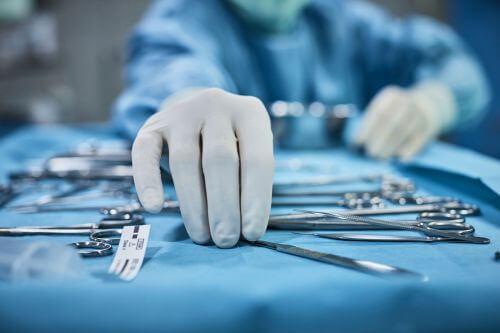It is the surgical removal of hemorrhoids (piles). This is usually done to resolve defecation problems that cause pain, bleeding, and discomfort. Hemorrhoid surgery can be performed using open or closed techniques. In the open technique, hemorrhoids are removed directly. In the closed technique, the hemorrhoid vessels are tied off, causing them to shrink. The postoperative recovery process depends on the patient's overall health. This procedure aims to improve patients' quality of life.
When is Hemorrhoid Surgery Performed?
 Advanced hemorrhoids can often cause severe pain and discomfort. If conservative treatment methods (medications, dietary changes, etc.) do not relieve these symptoms, surgery may be considered. They can cause bleeding during defecation. In cases of constant or excessive bleeding, hemorrhoid surgery may be recommended. The enlargement of hemorrhoids can negatively affect daily life. Large and protruding hemorrhoids may require surgery. If they recur frequently or become chronic, surgical intervention may be necessary. In the case of prolapsed external hemorrhoids (protruding during defecation), surgical intervention is recommended. The decision for surgery should be evaluated by the doctor based on the patient's health condition and other factors. Surgical options may vary depending on the type and stage of the hemorrhoid.
Advanced hemorrhoids can often cause severe pain and discomfort. If conservative treatment methods (medications, dietary changes, etc.) do not relieve these symptoms, surgery may be considered. They can cause bleeding during defecation. In cases of constant or excessive bleeding, hemorrhoid surgery may be recommended. The enlargement of hemorrhoids can negatively affect daily life. Large and protruding hemorrhoids may require surgery. If they recur frequently or become chronic, surgical intervention may be necessary. In the case of prolapsed external hemorrhoids (protruding during defecation), surgical intervention is recommended. The decision for surgery should be evaluated by the doctor based on the patient's health condition and other factors. Surgical options may vary depending on the type and stage of the hemorrhoid.
How is Hemorrhoid Surgery Performed?
 The patient's general health is assessed before hemorrhoid surgery. The doctor determines the method of anesthesia (general or local) for the patient. The patient is informed about fasting, medication use, and other preparations. Anesthesia is administered for the patient's comfort. This ensures that the patient does not feel pain. Hemorrhoidectomy is the most common method. Hemorrhoid tissue is removed with surgical instruments, usually under general anesthesia. Doppler-guided hemorrhoid artery ligation (THD) is a less invasive method. The vessels providing blood flow to the hemorrhoids are tied off, causing the hemorrhoids to shrink. In the stapler hemorrhoidopexy method, the remaining tissue in the large intestine is repositioned. This method generally results in less pain. After hemorrhoid surgery, the patient is monitored. Medications are given for pain management. Patients usually stay in the hospital for 1-2 days and are then discharged. The recovery process varies depending on the patient's overall health and the method used. There is a risk of postoperative complications. Therefore, it is important to follow the doctor's instructions. If severe pain, bleeding, or signs of infection are observed, the doctor should be consulted immediately.
The patient's general health is assessed before hemorrhoid surgery. The doctor determines the method of anesthesia (general or local) for the patient. The patient is informed about fasting, medication use, and other preparations. Anesthesia is administered for the patient's comfort. This ensures that the patient does not feel pain. Hemorrhoidectomy is the most common method. Hemorrhoid tissue is removed with surgical instruments, usually under general anesthesia. Doppler-guided hemorrhoid artery ligation (THD) is a less invasive method. The vessels providing blood flow to the hemorrhoids are tied off, causing the hemorrhoids to shrink. In the stapler hemorrhoidopexy method, the remaining tissue in the large intestine is repositioned. This method generally results in less pain. After hemorrhoid surgery, the patient is monitored. Medications are given for pain management. Patients usually stay in the hospital for 1-2 days and are then discharged. The recovery process varies depending on the patient's overall health and the method used. There is a risk of postoperative complications. Therefore, it is important to follow the doctor's instructions. If severe pain, bleeding, or signs of infection are observed, the doctor should be consulted immediately.
Postoperative Care After Hemorrhoid Surgery
 Rest as much as possible in the first few days after hemorrhoid surgery. Limiting physical activities supports recovery. Take the painkillers prescribed by your doctor regularly. Pain control helps you perform daily activities more comfortably. Follow a diet rich in fiber. Fruits, vegetables, and whole grains reduce the risk of constipation and help keep stools soft. Do not forget to drink plenty of water. Adequate fluid intake supports the regular functioning of the digestive system. Avoid heavy lifting and intense physical activity for the first few days. Light activities such as walking increase blood circulation. Do not postpone your toilet needs. Develop regular toilet habits to avoid straining during defecation. You can use natural products that soften the stool or medications recommended by your doctor. Keep the surgical area clean and dry. Follow the hygiene rules recommended by your doctor. Taking warm baths with hot water can reduce pain and support recovery. Do not miss the scheduled follow-up appointments after surgery. Your doctor will need these appointments to monitor the recovery process. In case of excessive bleeding, fever, severe pain, consult your doctor. Take the medications prescribed by your doctor regularly and follow the usage instructions. Following these recommendations will facilitate your postoperative process and protect your health. If you have any concerns after the surgery, do not forget to consult your doctor.
Rest as much as possible in the first few days after hemorrhoid surgery. Limiting physical activities supports recovery. Take the painkillers prescribed by your doctor regularly. Pain control helps you perform daily activities more comfortably. Follow a diet rich in fiber. Fruits, vegetables, and whole grains reduce the risk of constipation and help keep stools soft. Do not forget to drink plenty of water. Adequate fluid intake supports the regular functioning of the digestive system. Avoid heavy lifting and intense physical activity for the first few days. Light activities such as walking increase blood circulation. Do not postpone your toilet needs. Develop regular toilet habits to avoid straining during defecation. You can use natural products that soften the stool or medications recommended by your doctor. Keep the surgical area clean and dry. Follow the hygiene rules recommended by your doctor. Taking warm baths with hot water can reduce pain and support recovery. Do not miss the scheduled follow-up appointments after surgery. Your doctor will need these appointments to monitor the recovery process. In case of excessive bleeding, fever, severe pain, consult your doctor. Take the medications prescribed by your doctor regularly and follow the usage instructions. Following these recommendations will facilitate your postoperative process and protect your health. If you have any concerns after the surgery, do not forget to consult your doctor.


